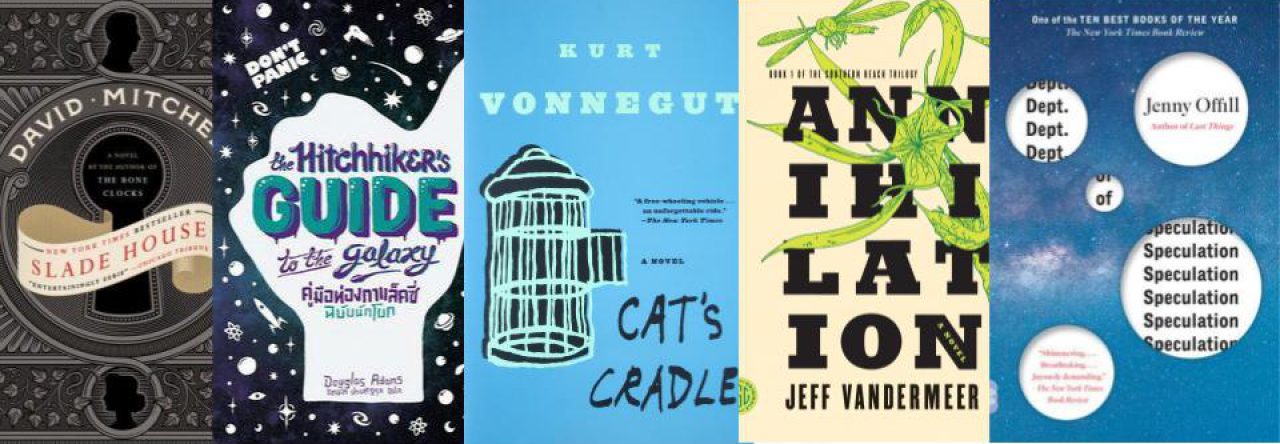
Over the past three blogs about Annihilation by Jeff Vandermeer, my group has come up with a network of controlling values, looked at form and genre, and searched for intertextual codes. In this final blog for the novel, I want to address (pun intended) who the narrator and the addressee are.
The narrator is the Biologist. We do not know her name, but her title gives away her profession. We also know that she is headstrong and likes to think for herself. While Area X is very dangerous, we learn that she is interested in exploring it. Unlike her the other women on her expedition, she doesn’t follow the psychologist (of course, inhaling the spores helped her to resist the hypnotism). As a researcher, she is very smart, and as a Biologist, she tries to study her environment.
She is an expert at what she does, so as readers, we automatically believe that what she is saying is the truth (“I believe I qualified because I specialized in transitional environments”-pg. 11). Though, she does indicate that Area X can mess with people’s minds, so maybe not everything she says is as it happens.
From the very first pages, we learn that the narrator is the Biologist (“I was the Biologist.”-pg. 3), and that this book is entries in a journal she is required to write in (“It was expected simply that we would keep a record, like this one, in a journal, like this one”-pg. 8). As the quote mentions, the members of the expedition were given journals to keep records of their expedition. This could be because unexplainable things happened to the very first expeditions, so each subsequent one was required to keep a record.
If something else happens to these expeditions, someone may be able to find out what happened to them. The Biologist becomes that someone when she finds the other journals (including her husband’s) in the lighthouse.
At the end of the story, the Biologist tells us that she plans to do the same as the people from the previous expeditions, and leave her journal in the lighthouse to be found.
“I have spent four long days perfecting this account you are reading, for all its faults, and it is supplemented by a second journal that records all of my findings from the various samples taken by myself and other members of our expedition…I have bound these materials together with my husband’s journal and will leave them here, atop the pile beneath the trapdoor.” (P. 193)
The Biologist chooses to explore on, leaving her records at the very top of a pile of multiple journals to be found by someone else. That someone else is the addressee.
Just to clarify, the addressee is the audience, the people who are reading or listening to the story. According to Peter Rabinowitz, there are about three types of audience, with the most straightforward one being the actual audience– the characters in the story who are listening to what the narrator has to say.
I believe that in Annihilation, the character(s) reading the Biologist’s journal are part of the 13th expedition. Like before, a new expedition is sent into Area X to find out what happened to the previous expedition. The 12th expedition (in which the Biologist belonged to) never came back, so the 13th expedition was sent to investigate (this could have happened years later, as the 12th expedition was expected to remain in Area X for a long time, with no means to communicate to the outside world). Eventually, someone from this new group would find their way to the lighthouse and discover the journals. What the someone does with that information is another question.
I think the Biologist hopes that the person who reads her journal is someone like her- someone who will think for him/herself. If the government group that sends the expedition includes another hypnotist, or just uses individuals who follow directions, whoever discovers the records might not do anything about them. Someone like the Biologist will learn from the journals and try to find out more about Area X.
I mentioned earlier that Peter Rabinowitz has three different types of audience. The second of these is the hypothetical audience– the people the author envisions will read his book. He bases his writing style and artistic choices based off this assumption. At its most simplest level, Jeff Vandermeer seemed to be writing an interesting story for fans of the science fiction/horror genres. But I also think he assumes that we as readers we do not fully trust the government or any Big Brother organization. We live in a world where secrets are kept from us, and we are being monitored almost at all time. Vandermeer hopes that we are like the Biologist, who thinks for herself, and follows what she believes is right (this will make our connection and understanding of the Biologist greater).Like the Biologist, we have learned to question things and investigate on our own.
We need to become the narrative audience– the readers who who understand what the story is an imitation of real life. As the best case scenario, we need to assume that we are the addressee that the Biologist hopes will read the journals- the person who knows not to trust the big organization and to think for him/herself. The fictional world is an imitation of real life, and as we see that the Biologist is someone who has a very similar mindset to us in the real world, we are clued in to imitate our ideals as the actual audience in the novel. We have to believe that the character we are in the narrative thinks like us and the Biologist.
By Alex

Hi Alex! Great job as usual! In the blog, you touch on how the biologist is interested in exploring the area, which is one of the reasons that she signed up for the expedition in the first place. That curiosity and her headstrong demeanor, makes her stand out from the rest of the group. Therefore, I feel as though the addressee must possess these same qualities. Someone who allows their curiosity to take over and is willing to deal with any consequences that may arise from this. The addressee must also be able to let go of their fear of the unknown and not let it hold them back. As a reader of this novel, we must also possess some, if not all of these traits, as well. On pages 184 -185, we get a sense that the Biologist is contemplating whether or not to leave Area X. This does a great job of reigniting our curiosity to the point that we are almost begging her not to leave. This also speaks a lot about our natural wanting for closure/ answers. We cannot help but sigh with relief when she turns away from the door and heads back into Area X, again. “So I turned around, and, in a great deal of pain, feeling as if I had let a part of myself there, I began to trudge back up those steps, the image of a hazy door of light as larger in my imagination as the immensity of the Crawler. (P. 185)” Although she wants to go through the door, it is not time and the story must go on. Which is crazy if you think about it, because how are we any different from the government, who is sending her in without a care if she survives so that they can find the truth? In a way we are experimenting with her for our own personal gains just like a lab rat, just as the government is. Lastly, I also like how you questioned the truthfulness of her notes. We know fairly early on in the book that she has become contaminated and we are unsure how that is affecting her/ the truth.
LikeLike
Alex really concise blog, I think you and Brittany start to touch on how the addressee has to be somewhat like the Biologist to take her journal and trust its contents. But what I’m wondering is what really makes her any different than any of the others? How many expeditions has had someone like her, that thinks the way she does? Or is she one of the firsts? I think her predisposition to solitude, but failure to thrive alone makes her into a complex character. She wants something she can not let herself truly have, but maybe here, in Area X, she can. When she finally decides to head north like her husband I do not think she is disillusioned that she’ll find him, but she has answers to seek for herself, she can finally be exactly who she is, even if she can no longer be who she was since she arrived and began to change. It’s fun to wonder if she was actually always like this and Area X is only letting her be who she was, or if she is changing, becoming something else, like the creature in the reeds, or the dolphin with human eyes. Could we possible see the biologist again in a later book, a lone wolf along the coast that somehow says without saying she is lonely, all through the way she watches the waves? Or will she reappear, a shell of herself back across the border?
LikeLike
I feel that it was an absolutely great idea to include the notion of having a “reliable narrator” in this blog. Many times we, as readers, are far too trusting of our narrator, particularly in first person, and when it comes to a character who may have not started off emotionally stable herself in the first place (after all, with all the failed and traumatic expeditions, a voyage into Area X could rightfully be seen as a suicide mission, so what does that say about her willingness to go?) combined with the fact that she directly inhaled spores from Area X, which is known quite well to mess with people’s minds, we as readers must take everything that is told to us through the narrator with a hint of salt. The very fact that they sent along a Psychologist as the leader of the team should make us incredibly suspect of just about everything being told, and overall, it means even more mysteries are to be unraveled in future books in the series.
LikeLike